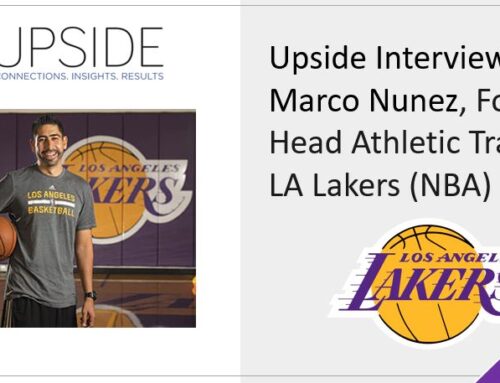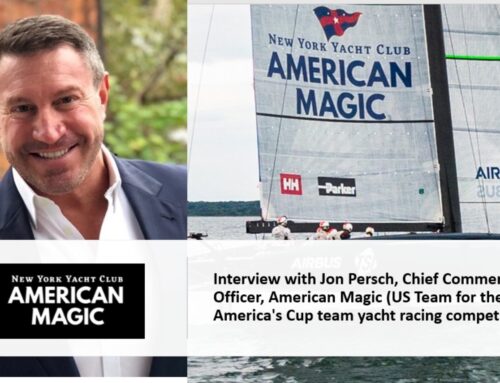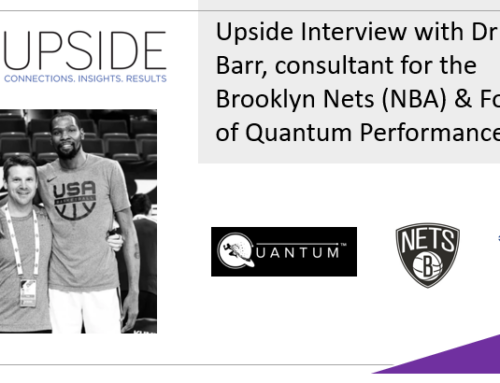This week we had the honor to interview Kai Bond, partner at Courtside Ventures, a leading sports tech VC, focused on early-stage sports, fitness, and gaming companies. Kai is a repeat founder, starting 3 companies and has spent the last 5 years as an early stage investor in NYC.

?Show Notes:Throughout our conversation, we talked about his background (3x founder, Comcast Ventures, Samsung NEXT, Microsoft..), how he got into venture capitalism, and his view on the esport and gaming market and his advice for startups looking to raise money.
?Best Quotes: Here’s some of the key discussion points and best quotes from our conversation with Kai:
- On his background: “So my background is as a founder. I was a founder three times over. My first company, which started in 2006, was in the gaming ecosystem. I started a second company in 2010, which was also focused on the gaming ecosystem. And then another company in 2014, which was an interactive streaming platform called pixieTV, focused on creating enhanced viewing experiences over live broadcast. And so, over 10 years as an entrepreneur, three different businesses, building teams at different scales and sizes, I really built up a tremendous amount of knowledge around running a startup and being a founder. It’s hard to understand what it’s like being a founder without walking in those shoes. And so my path into venture was primarily through a founder lens”.
- On how he got into the VC world: “I was fortunate enough to have my third company, pixieTV, acquired by Samsung. And when I spent about a year launching that product globally within the Samsung smart TV ecosystem, I realized a couple of things. One is that I’m a pretty bad employee. So going from running small startups and companies to being part of a 380,000 person machine was a difficult transition. And what I realized most was that the area and the stage that I like working on most was a very early stage company formation. And I was fortunate enough to get a role at what was then called the Samsung Global Innovation Center, now called Samsung NEXT, and lead their accelerator program, working with early stage founders from concept to building out initial products, to helping that scale. And so that was really my first experience working in an investment capacity and I found the coaching, the mentoring, the advising of early stage founders to be incredibly rewarding”.
- On what he is looking for when investing in startups: “For me, it’s always team first. When I think about the best companies in the world, what you say you are going to build day one and what it ends up becoming are very, very different things. And you have to have a team that is resilient, that is determined, that’s passionate. But most importantly, it has to be a team that has some unique insight or perspective into this problem, this solution, and this opportunity. They see a vision or they have a spark that no one else has. And so the team first is always kind of the first thing”.
- On the investment thesis at Courtside Ventures: “We are thesis driven investors. So in the gaming and esport ecosystems, we have lanes that we like to play in that fit that investment thesis. So we’re looking for, how can we as a VC group accelerate and help the investment scale more rapidly, reach a greater user base, and identify partnerships. And that’s key for us. As a vertically focused fund, we are not just going to run scattershot, but we definitely have very honed-in perspectives on what we want to invest in and why, and why we think the timing is right. And that plays heavily for us as we evaluate companies that are raising in this current market. (..) We have a rigorous rating platform where we go through and rank the team, rate the product market fit, look at the KPIs, the progress they’ve made to date. And we use that as a litmus test of how we should lean in, how aggressively we are going to go after this opportunity, where it stack rank, and why we should move forward. And so there’s a rigor, I think all of us coming from a founder background and understanding how to build great products, that filters into our thinking and informs our beliefs around how we create a sustainable long term fund that can generate great returns”.
- On his view on the esport and gaming market: “It’s always interesting to talk about the size of the esport ecosystem based on revenue because it’s an incredibly early market in the U.S., and that’s primarily where we’re focused on investing in: The U.S. and Western Europe. And so, it’s hard to say it’s a billion dollar market. When you look at the overall gaming ecosystem, gaming is on track to be $158 billion of revenue on an annual basis. And so, we invest in both sides. What makes esport an interesting opportunity is, one, there’s hyper-growth in the category. Two, there are no large incumbents other than, maybe you can say Twitch, in the world of gaming and esport that dominate, and so there will be category winners. So this is a unique moment in time that everyone’s looking at and saying, there will be category defining companies that become multibillion dollar businesses”.
- On the most interesting things he is seeing in esport right now: “I think what’s most interesting when you think about the esport ecosystem are two things. One is viewership. Audience. There are hundreds of millions of people watching gaming. And so the interactive streaming side, and the ability to drive a new medium of entertainment, is one area that’s extremely exciting for us. And when you look at the other side, it’s the interactivity, it’s the accessibility. So not only are you viewing, but you’re also playing. And I think oftentimes when we think about the world of esport, people are thinking about the hyper competitive Overwatch league, or you’re thinking about esport teams, but the reality is, you have a spectrum here. You have youth and high school sports. PlayVS is going after this. And rolling out the ability to create high school esport, collegiate esport”.
- On why the esport market is accelerating with COVID-19 as one of the new drivers: “When we think about esports, I think this combination of entertainment, viewability, interactivity, combined with accessibility and participatory nature of what you’re doing is what is making people gravitate towards it. Now, you throw in the macro conditions that we’re in now, with shelter in place, COVID-19, staying at home, and you’re seeing just a rapid acceleration at all levels, from competitive to mid-core to casual. And that’s kind of where we see the ecosystem evolving, is that this is going to be something that everyone plays at every level, rather than just kind of the pro and high end of the competitive spectrum (..) You see Players’ Lounge having more engagement, more wagering across the entire platform. And so, you kind of look at individual businesses and then you take a step back and you look at the portfolio that we’ve constructed out of fund one and fund two, and you see this massive uptick in terms of engagement, adoption, and viewership. And so it’s an incredible time to be part of this world in this time”.
- On the key trends he is seeing in the world of esport: “I think accessibility is probably one of the key trends. You’re seeing people playing on mobile phones, you’re seeing people play on desktop, you’re seeing this going across consoles. And that’s a global phenomenon. Cross-platform gaming, to me, is something where typically we’re seeing a casual gamer on a mobile device, but now you’re seeing an adoption of the PUBGs and Fortnite on a mobile device. So I think having the ability to continue playing across platforms is a fascinating thing in terms of accessibility. We’re just at the very beginning phases of true interactivity. When you think about people playing Fortnite and then coming in and watching a concert we’re taking those small steps towards what the metaverse will look like. And so, to me, this idea of community, of really forming not only entertainment, but networks around this. We wrote a blog post around, and you are seeing this today, tremendous levels of engagement around the community. This is a new way for the next generation to socialize and engage and have fun. And it’s not just about the game itself, it’s about forming a community around it. And that’s a special trend we’re seeing throughout, at every level”.
- On why teams and leagues are entering the esport world, especially right now with the COVID-19 pandemic: “I think the second factor here is understanding that for many leagues around the world, the idea of fan participation, i.e. going to a stadium and watching a game, is uncertain. We don’t know when that’s going to happen again. And the idea that you can enable some sort of participation around your favorite athletes, or members of the team, or the leagues that you’re in, gives another way to connect. And so there’s a lot going on. When you look at the NASCAR race in the U.S., you find that particularly fascinating. All of the drivers have this simulator in their house. They’re driving, they’re broadcasting. It was a massive success. Fans are engaged. And you get a unique snapshot into the lives of these racers. There’s this thing set up, they’re posting on social media. And then there’s the race and the event itself. So it’s not too different than when an NBA player comes down, and what they are wearing as they’re coming into the arena has become like a whole thing. You’re looking for ways to connect, and this level of entertainment, this level of engagement, supplements the traditional sports experience and just allows you to really connect in a different way”.
- On how he sees the esport market evolving in the coming years: “I’ve been in gaming since we were developing BREW and J2ME games on a flip phone. And you had up, down, left, right, soft key 1 and soft key 2. And even back to the days of arcade, right? And I think when I think about the core elements of what makes esport fun, it’s kind of like going back to that arcade when you’re playing an arcade game and who had the high score in that arcade, and how do you get your name to the top of the heap. Well, now that’s just been taken from your local arcade, of maybe the 50 people you knew in your neighborhood or your area who went there, and blew it out to be able to be connected with people globally. And so I think there’s a lot of consistent elements that we’re seeing over the years of what makes esport fun and entertaining, but really, I think what we’re interested in as a fund is that esport represents the combination of gaming, of streaming, interactivity, and media. And you wrap all of that in a layer of fun which is why I think the sky’s the limit. And everyone is going to perceive it in a different way”.
- On the emergence of a new generation of esports gamers: “I think the next generation of esport gamers will be something very similar in terms of how we see a gamer. And you went from hardcore games to your casual gamer on mobile phones. I think you’re going to see what we perceive today as somebody who’s participating in esport no longer thinks of it as esport, but we are just going to think about it as a community, connectivity, entertainment. And so that’s a fun transition to go through, when you start with the core and then you bring it to the mass audiences. We’re already there from the mass audiences, from a viewership and engagement perspective. I think when you start to talk about democratizing the tools to play, to participate, to engage, that’s when the fun really starts, and we’re just at the beginning of that right now”.
- On his advice to startups looking to raise money right now: “It is a tough environment right now. There are a lot of funds that have put down bets, in the last, let’s call it three to four years, who are still trying to figure out what those outcomes are going to look like. There has not been a lot of liquidity in the space. And so if you’re a venture capitalist and you’re raising from LPs, you’re trying to show markups, you’re trying to show exits and results. And so a lot of that is still coming, and we’re in the very early stages. And so what I always tell people who are looking to start a company in the space is it goes back to that team. What is the unique value proposition? What is the insight? What is the aha moment that you had that will allow you to create a product, a service, a technology, which will allow this industry to move forward”.











Leave A Comment
You must be logged in to post a comment.